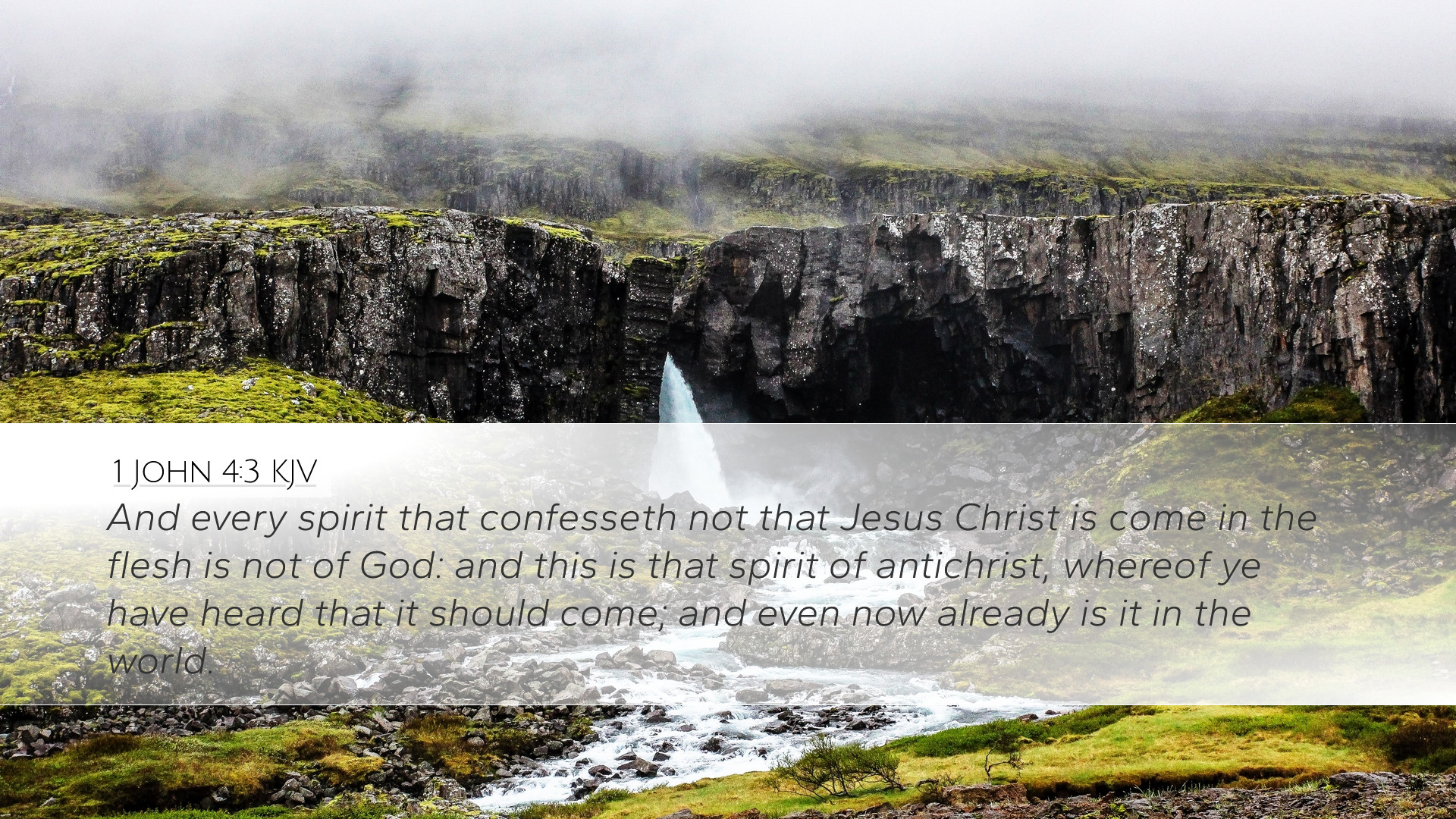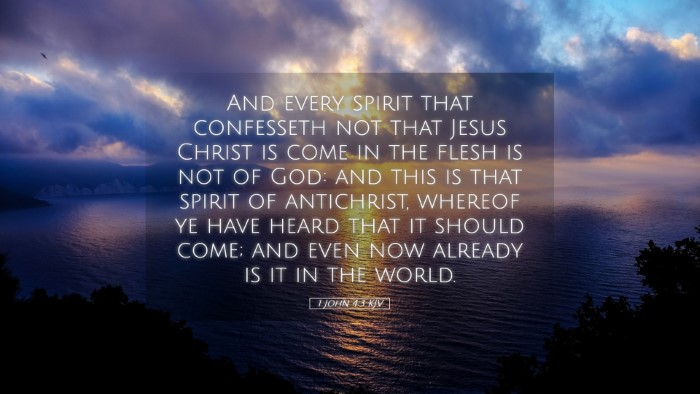Old Testament
Genesis Exodus Leviticus Numbers Deuteronomy Joshua Judges Ruth 1 Samuel 2 Samuel 1 Kings 2 Kings 1 Chronicles 2 Chronicles Ezra Nehemiah Esther Job Psalms Proverbs Ecclesiastes Song of Solomon Isaiah Jeremiah Lamentations Ezekiel Daniel Hosea Joel Amos Obadiah Jonah Micah Nahum Habakkuk Zephaniah Haggai Zechariah Malachi1 John 4:3
1 John 4:3 KJV
And every spirit that confesseth not that Jesus Christ is come in the flesh is not of God: and this is that spirit of antichrist, whereof ye have heard that it should come; and even now already is it in the world.
1 John 4:3 Bible Commentary
Commentary on 1 John 4:3
Verse: "And every spirit that does not confess Jesus is not from God. This is the spirit of the antichrist, which you heard was coming and now is in the world already." (1 John 4:3)
Introduction
This verse encapsulates a critical theme of the epistle of John—the discernment between the spirits that confess Christ and those that do not. The apostle John aims to reinforce the church's understanding of true and false teaching as it relates to the person and work of Jesus Christ. Commentators such as Matthew Henry, Albert Barnes, and Adam Clarke provide rich insights into the theological and practical implications of this scripture.
The Nature of the Confession
Matthew Henry's Insight: Henry notes that the act of confessing Jesus is not merely a verbal acknowledgment but a recognition that encompasses the fullness of His divinity and humanity. For Henry, true confession involves an acceptance of Christ as the Son of God who came in the flesh, which denotes allegiance to His teachings and the heart of the Gospel.
Albert Barnes' Perspective: Barnes emphasizes that the acknowledgment of Jesus as the Christ is a definitive mark of a true believer. He discusses how the word “confess” implies a bold declaration of faith that stands in stark contrast to the spirits of error that deny Christ’s incarnation. This recognition is foundational for the believer's faith and a standard for measuring the authenticity of spiritual revelation.
The Antichrist and Its Spirits
Adam Clarke's Analysis: Clarke draws attention to the term "antichrist," indicating that it signifies both a singular figure and a broader category of opposing spirits that deny the Lordship of Christ. He identifies these spirits as manifestations of error that attack the fundamental truths of Christianity. Clarke elucidates that the presence of the antichristian spirit in the world originated with the denial of Christ and will persist until the end of the age.
Shared Themes: All three commentators agree that the spirit of the antichrist is pervasive and seeks to lead believers astray by undermining the truth of Jesus' identity. This theme of vigilance against spiritual deception is vital for pastoral care, teaching, and equipping the church to recognize and reject false teachings.
Implications for Believers
Matthew Henry: Henry exhorts believers to be diligent in their discernment, recognizing that the denial of Christ is one of the most formidable threats to the faith community. He advises that Christians must be grounded in the truth of Scripture and foster a robust relationship with God to recognize the voices that contradict Christ.
Albert Barnes: He highlights the necessity for believers to critically evaluate the teachings they encounter and the spirits that inspire them. The believer's wisdom lies in aligning their beliefs and practices with the truth of God's Word, invariably leading them back to the fundamental teachings of Christ.
Adam Clarke: Clarke emphasizes the communal aspect of this discernment. He argues that the church must collectively uphold the truth of Jesus Christ to foster a healthy spiritual environment. The body of believers serves as a safeguard against the antichristian influence through shared teaching and accountability.
Conclusion
In summary, 1 John 4:3 serves as a powerful reminder of the ongoing battle between truth and deception within the Christian faith. Through the lenses of Matthew Henry, Albert Barnes, and Adam Clarke, we gain profound insights into the nature of true confession and the necessity for vigilance against teachings that do not align with the acknowledgment of Jesus as the Christ. Pastors, students, theologians, and scholars must heed these insights to fortify their understanding and practice of the faith.


